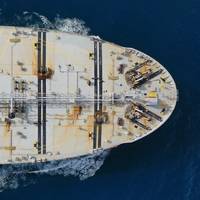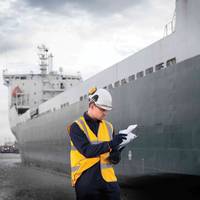Secondhand Prices Put a Damper on Tanker Demolitions -BIMCO

The year 2021 has been tough on crude oil tanker freight rates across the board so far. Consequently, the industry buzz has been all about largescale scrapping of tankers, but so far, it has been all talk and very little walk, as the secondhand market has proved a much-preferred alternative, says industry group BIMCO.Although demolitions are up from the start of last year, only two shuttle tankers and two Aframax crude oil carriers (450,000 DWT) have been confirmed demolished in the first two months of 2021, according to data from Clarksons.
31 Years Ago Today: The Exxon Valdez Oil Spill

On March 24. 1989, the single-hull tanker Exxon Valdez was departing the Port of Valdez, Alaska with a full load of North Slope crude oil (approximately 1.26 million barrels) destined for Long Beach when it grounded on Bligh Reef in Prince William Sound. The resulting oil spill (approximately 258,000 barrels), while not the largest in US history, was clearly the most important. It engendered much litigation. Public concern over the spill led directly to enactment of the Oil Pollution Act of 1990 (OPA 90)…
Thordon Bearings Launches Oil Savings Calculator
Thordon Bearings has developed a bespoke modeling tool capable of calculating the amount of operational oil prevented from leaking into the world’s oceans with each installation of a seawater-lubricated propeller shaft bearing. To be launched officially on April 22 to coincide with Earth Day 2016, the world’s largest environmental movement, now in its 46th year, the Oil Savings Calculator shows that more than 60 million liters of oil pollution has been saved to date. “In our opinion the only acceptable propeller shaft stern tube oil leakage is zero.” said Terry McGowan, President & CEO Thordon Bearings. “Thanks to those vessels that have already installed seawater-lubricated propeller shaft bearings…
Lubricant Usage Standards in the 2013 Vessel General Permit

Environmentally acceptable lubricants required in Oil-to-Sea interfaces where technically feasible. With the recent release of the 2013 Vessel General Permit (VGP), vessel owner/operators must review their operational practices for incidental discharge of lubricants to the marine environment. Lubricant discharge limits from oil-to-sea interfaces are just one of 27 specific discharge categories covered by the VGP for vessels to achieve compliance with the US Clean Water Act (CWA).
Coast Guard Should Rethink Salvage and Firefighting Proposal, AWO Says
The Coast Guard's May 10 proposal to add costly and prescriptive salvage and firefighting provisions to its tank vessel response plan regulations should be overhauled in favor of a simpler and more practical approach, AWO testified at a July 17 public meeting in Philadelphia, Pa. The need for the proposed rule has not been demonstrated. The Oil Pollution Act of 1990 is working well, both on the prevention and the response fronts. Academy of Sciences have acknowledged that spill response has been timely and effective since the passage of OPA 90. "Quite simply, the Coast Guard has failed to demonstrate that this costly proposal is necessary to achieve the pollution prevention objectives of OPA 90," Carpenter said.
Government Update: Signed Confessions
Many in the maritime industry are beginning to view the oil record book as a signed confession. The number of prosecutions in the United States for fraudulent entries in oil record books is rising exponentially and fines have recently skyrocketed. In the years 1998 through 2001, research has revealed one prosecution in each year for oil record book violations. In 2002, there were seven prosecutions - and four of those were against individual chief engineers. In 2003, nine prosecutions, four of which were again against individual chief engineers. Through the middle of August 2004, there have been seven prosecutions, and only two were directed at individual chief engineers. Criminal fines to date have totaled $52,285,000.
U.S. Requires Nontank Vessel Response Plans
The U.S. Coast Guard recently issued interim guidance for the development and review of oil spill response plans for nontank vessels. Since 1993, tank vessels have carried oil spill response plans. A recent legislative change will soon mandate similar response plans for most other ships. The problem is that the legislation requires nontank vessels to have the response plans sooner than the Coast Guard can promulgate regulations in accordance with standard procedures. Thus, the agency is unofficially advising stakeholders on how to comply with the legislation. Stakeholders will ignore the unofficial advice at their peril. The legislation has real teeth.
Senate Hearing on Reducing Oil Spill Risk
On August 1, the Subcommittee on Fisheries and Coast Guard of the Senate Committee on Commerce, Science, and Transportation conducted a field hearing in Seattle on Reducing the Risk of Future Oil Spills. Among the various witnesses, Captain Myles Boothe, USCG testified that the majority of oil entering waters of the United States comes from land-based sources and the majority of vessel-based oil spills in the Pacific Northwest comes from recreational and fishing vessels. Mr. Dale Jensen, Washington State Department of Ecology, testified that state and regional agencies should be allowed to establish higher vessel pollution prevention standards than those utilized by the federal government. Dr.
AWO President Testifies on OPA 90
At a joint hearing of the USCG and Maritime Transportation Subcommittee and the Water Resources and Environment Subcommittee of the House Committee on Transportation and Infrastructure, AWO President Tom Allegretti testified the maritime industry is moving more oil safely than ever before. The hearing, held on the tenth anniversary of the Exxon Valdez oil spill, sought to expore the effectiveness of OPA 90. Allegretti testified OPA 90 launched a process that is dramatically working to reduce spills and the risk of spills. According to the USCG, in 1990, tankbarges moved 72 billion gllons of oil, spilling 992,000. However, in 1997, tankbarges moved roughly the same amoung - 71.5 billion gallons - whjile spilling only 166,000 gallons, resulting in 83 percent less oil spilled.









